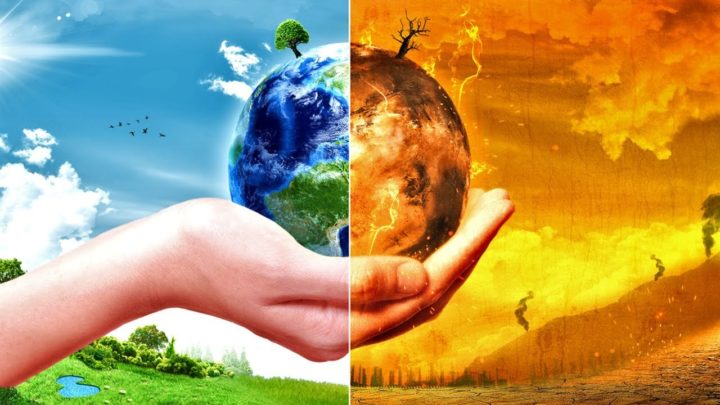By Binu Mathew
The COVID-19 has taught us that we are in an emergency. In 2019 a teenager named Greta Thumberg was crying hoarse that we are in an emergency and no one was listening. It’s time for us to take stock of the matter. Which is the greater emergency, this COVID-19 emergency or the climate emergency that Greta Thumberg was warning about?
A UN report by Intergovernmental Science-Policy Platform on Biodiversity and Ecosystem Services (IPBES) published in May 6 2019 reported:
Up to 1 million: species threatened with extinction, many within decades
>500,000 (+/-9%): share of the world’s estimated 5.9 million terrestrial species with insufficient habitat for long term survival without habitat restoration
>40%: amphibian species threatened with extinction
Almost 33%: reef forming corals, sharks and shark relatives, and >33% marine mammals threatened with extinction
25%: average proportion of species threatened with extinction across terrestrial, freshwater and marine vertebrate, invertebrate and plant groups that have been studied in sufficient detail
At least 680: vertebrate species driven to extinction by human actions since the 16th century
+/-10%: tentative estimate of proportion of insect species threatened with extinction
>20%: decline in average abundance of native species in most major terrestrial biomes, mostly since 1900
>6: species of ungulate (hoofed mammals) would likely be extinct or surviving only in captivity today without conservation measures
Food and Agriculture
Yes this is an EMERGENCY that very few is talking about.
Why all these species are going extinct? Just because the actions of this invasive dominant species called homosapiens!
The same UN report points out that:
1 degree Celsius: average global temperature difference in 2017 compared to pre-industrial levels, rising +/-0.2 (+/-0.1) degrees Celsius per decade
>3 mm: annual average global sea level rise over the past two decades
16-21 cm: rise in global average sea level since 1900
100% increase since 1980 in greenhouse gas emissions, raising average global temperature by at least 0.7 degree
40%: rise in carbon footprint of tourism (to 4.5Gt of carbon dioxide) from 2009 to 2013
8%: of total greenhouse gas emissions are from transport and food consumption related to tourism
5%: estimated fraction of species at risk of extinction from 2°C warming alone, rising to 16% at 4.3°C warming
Even for global warming of 1.5 to 2 degrees, the majority of terrestrial species ranges are projected to shrink profoundly.
When Countercurrents.org started in 2002 the CO2 level in atmosphere was 370 ppm. Now it stands at 412 ppm. Dr. Andrew Glikson, a climate scientist has pointed out in several articles in CC that total green house gases in the atmosphere in the atmosphere including CO2, Methane, Nitrous Oxide, Ozone etc has topped 500ppm.
The Paris Agreement’s goal is to keep the increase in global average temperature to well below 2 °C above pre-industrial levels; and to pursue efforts to limit the increase to 1.5 °C.
Coordinated by the World Meteorological Organisation which is also backed by the United Nations Environment Programme and the Intergovernmental Panel on Climate Change, the United in Science report released in September 2019 estimates global emissions are not likely to peak before 2030 on the current trajectory. It says policies to reduce emissions must triple to meet the 2°C target and increase fivefold to keep heating to within 1.5°C.
With the forced COVID-19 lockdown we are well on track to reach the Paris temperature goals. The COVID lockdown taught us what is essential for our sustenance. Most of the carbon emitting vehicles and airplanes are grounded. Our consumption has come down to our basic essentials. Continents jumping tourism has come to a standstill, so has the neoliberal globalisation. It is good time for gloablisation to fail and save our planet. Pollution has come down. Cities have become serene. Rivers have become clean. We’ll have to wait for authentic studies to confirm how much carbon footprint did we reduce.
We were living a reckless life like there is no tomorrow, consuming as much as we can and travelling as far as we can. COVID lockdown has put a break to this reckless lifestyle. In fact it is so much better for the environment. The COVID lockdown has taught us how much wastage we were making. It also taught us we can live better life with much less than we usually consume.
The COVID lockdown has also taught us we have to do a lot more work to do make our economy resilient. We have to make our local economies resilient. We have to grow our food in our neighbourhood. It will create more local jobs and stop the long haul migration to the cities. The cities too have to become resilient by producing its own food. May be the cities itself may not be a good idea and wither away.
The COVID lockdown has given us a sneak preview into the future if we are to meet the global temperature goals. We have no other choice if we are to believe our science experts. Scientists like James Hansen predicts that even the human species may go extinct if we can not control global warming.
Human civilization has seen many pandemics and have won over all of them. We’ll overcome this pandemic too. But I’m not so sure about the battle against global warming. The COVID-19 lockdown has taught us that we can win the battle against global warming too. With a little bit more planning we can do even better.
Binu Mathew is the editor of Countercurrents.org






